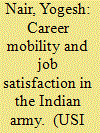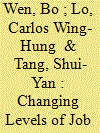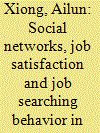| Srl | Item |
| 1 |
ID:
101945


|
|
|
| 2 |
ID:
173460


|
|
|
|
|
| Summary/Abstract |
As a result of multiple waves of administrative reforms in the past three decades, China's civil service has become more professionalized. Yet public employees appear to have become increasingly dissatisfied in recent years. Based on questionnaire surveys and interviews with environmental enforcement officials in a southern city, this paper traces changes in the job satisfaction levels of these officials between 2000 and 2014. It shows that satisfaction with the extrinsic rewards received and overall job satisfaction declined during this period. These downward trends partly reflected the increasingly challenging institutional environments faced by the officials: rising political and societal demands, inadequate fiscal and personnel resources, and limited enforcement authority. In addition, as the officials became more highly educated and professionalized, mission match became a stronger antecedent of job satisfaction. These findings suggest the importance of meeting the motivational needs of a more professionalized workforce.
|
|
|
|
|
|
|
|
|
|
|
|
|
|
|
|
| 3 |
ID:
089972


|
|
|
|
|
| Publication |
2009.
|
| Summary/Abstract |
This study examines the effect of own income versus reference group income and the subjective factors considered important in a job for a sample of off-farm migrants in China. We find that own income has a positive effect on job satisfaction while the effect of reference group income is gender specific. We find evidence that males experience a tunnelling effect (higher income co-workers increase their job satisfaction) while females experience a jealousy effect (higher income co-workers lower their job satisfaction). We explain this result in terms of men reacting more positively in competitive environments and that, in China, males have better prospects for promotion. We find that compared with employees in western countries, off-farm migrants in China place much more emphasis on income and less importance on collegiality and job stability.
|
|
|
|
|
|
|
|
|
|
|
|
|
|
|
|
| 4 |
ID:
097375


|
|
|
| 5 |
ID:
121630


|
|
|
|
|
| Publication |
2013.
|
| Summary/Abstract |
In studying the correlates of job satisfaction among political science faculty we confirm some findings from other disciplines, such as the relationship between institutional type and satisfaction. We demonstrate that those working in top-ranked departments or in private institutions tend to have higher levels of satisfaction with their jobs and with their contributions to the profession. Both job satisfaction and professional satisfaction tend to be highest among full professors; and greater productivity in terms of publishing is independently linked to greater levels of professional satisfaction. In contrast, comparatively higher undergraduate teaching loads undermine professional satisfaction. We also determine that men and women do not differ systematically from one another in their satisfaction levels. We do, however, document significantly lower levels of satisfaction among racial minorities in political science departments. In exploring this finding, we uncover reports of discrimination and dramatic differences in levels of collegiality experienced by different subgroups of faculty members. Experiences with discrimination undermine job satisfaction and are more frequently reported by women than men and are more common among minority faculty than nonminorities.
|
|
|
|
|
|
|
|
|
|
|
|
|
|
|
|
| 6 |
ID:
099141


|
|
|
| 7 |
ID:
159028


|
|
|
|
|
| Summary/Abstract |
This study first investigates determinants of job searching strategies and then examines if social networks are connected with better job outcomes. Unlike previous studies that focus solely on income, this paper pays more heed to job satisfaction. Based on data drawn from China General Social Survey, we find that disadvantaged job seekers rely primarily on informal channels; whereas experienced and better-educated job seekers tend to search for jobs through formal channels. However, those reaping the largest benefit from using networks are the job seekers who are able to use formal and informal channels jointly. By disaggregating the whole sample, we further find that the promoting effect of network use is contingent on factors such as gender and types of jobs. Network use brings about larger benefits to female and job seekers target to prestigious occupations. Finally, it appears that whether a job seeker can receive influential help depends primarily on the social status of the contacts rather than their tie strength. The results of our paper thus urge us to examine the combination of different searching strategies rather than studying them separately.
|
|
|
|
|
|
|
|
|
|
|
|
|
|
|
|